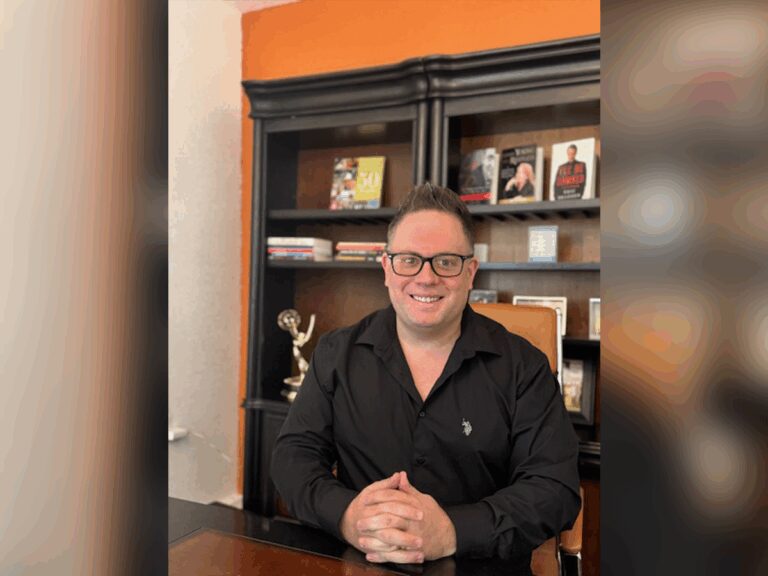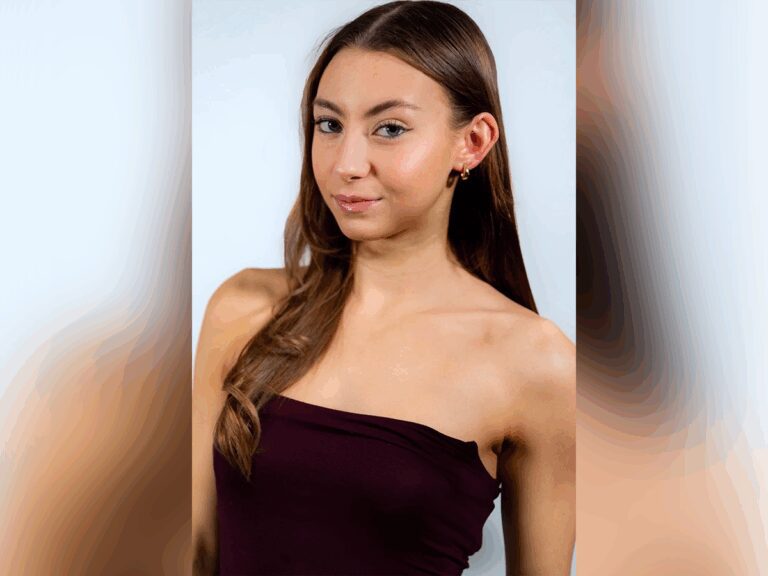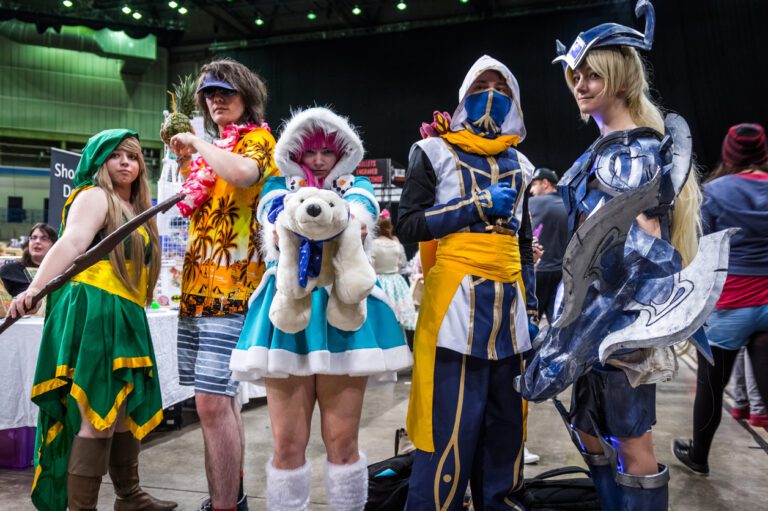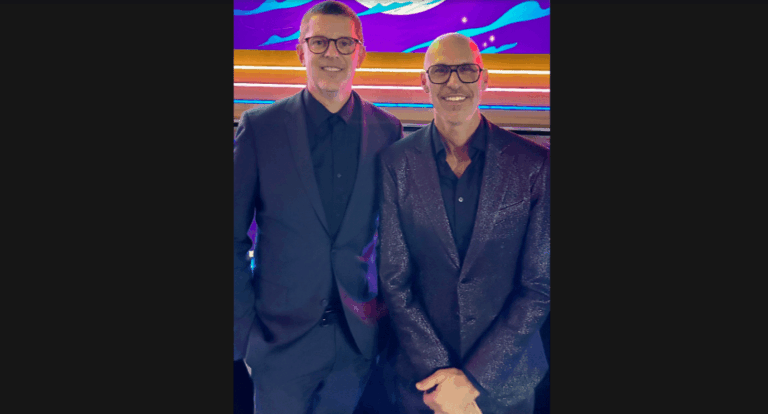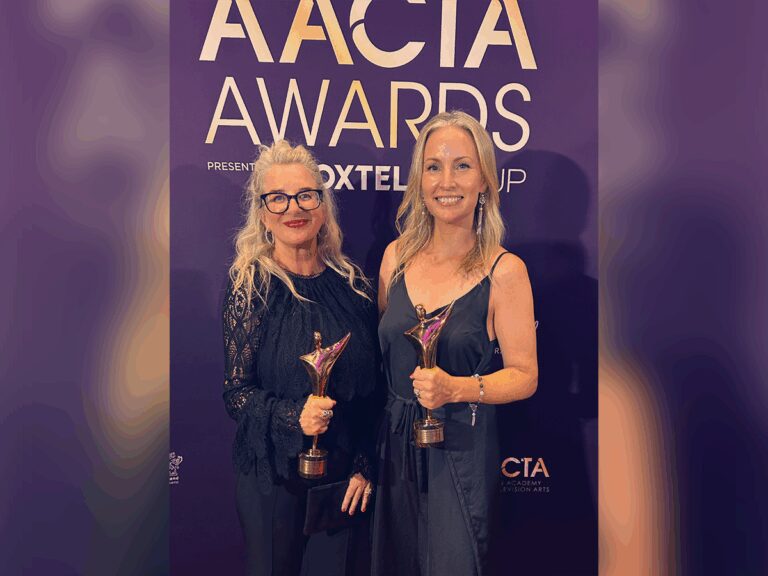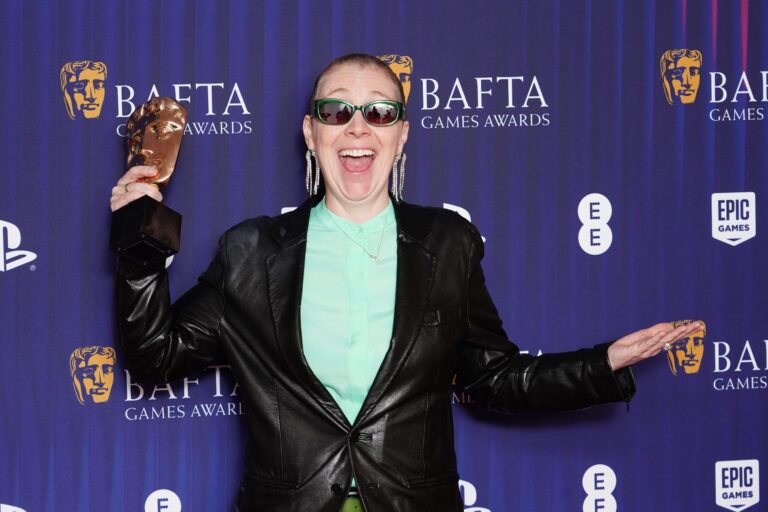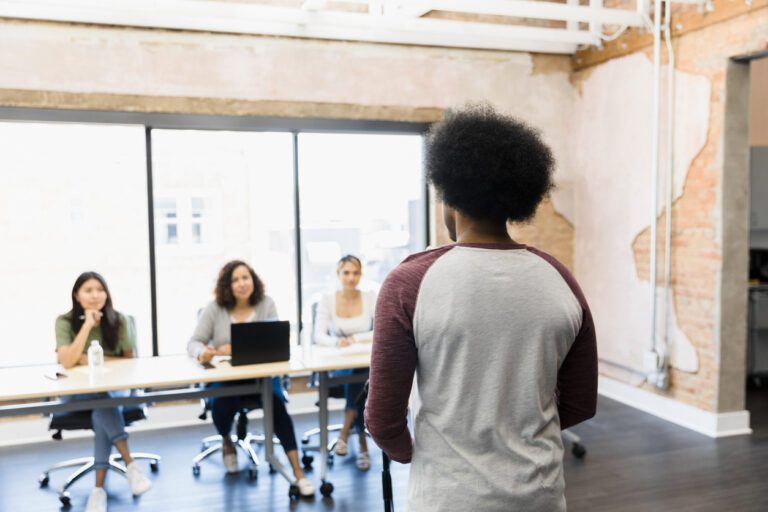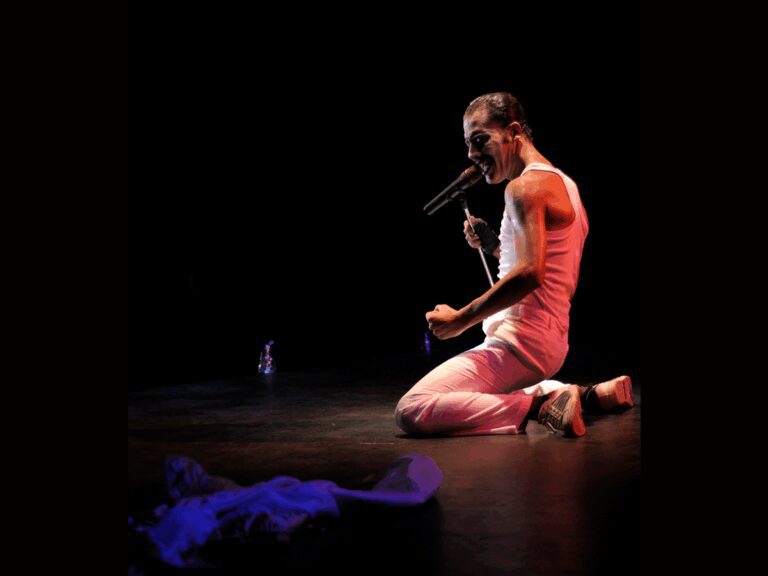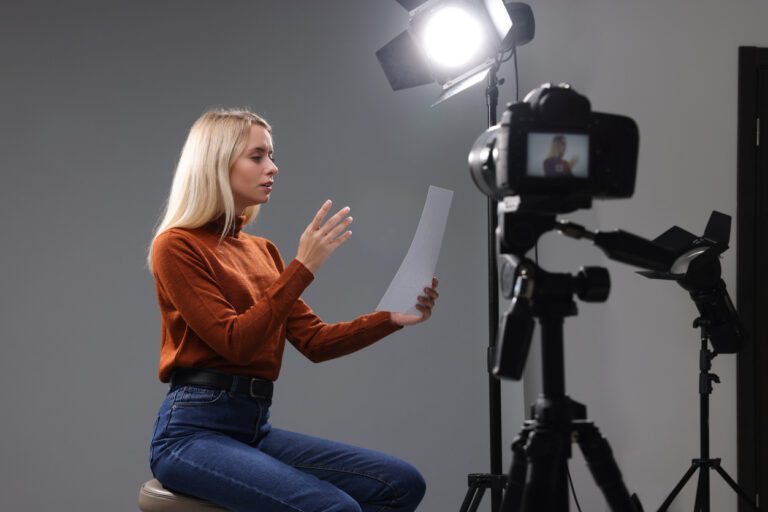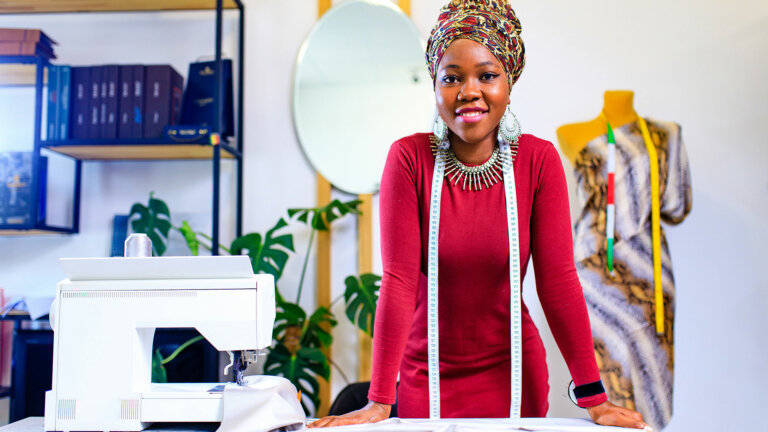Brooke Vass always dreamed of life in the spotlight — whether on stage, in front of the camera, or leading her high-energy fitness and dance-themed YouTube Channel, Barre By Brooke.
From a childhood spent dancing to landing her first major acting gigs, Vass’ journey has been anything but ordinary. By blending her passions for performance and fitness, she’s building an acting career that’s both unconventional and inspiring.
Vass shares how she chased her dream job, landing a role in a recruitment video with [robotics company] Boston Dynamics, and offers the candid advice every aspiring performer needs to hear. Keep reading to discover how she turned background roles into big opportunities — and how you can, too.
Takeaways From Brooke Vass
- Submit yourself for a wide range of roles, including background parts, and highlight all your special skills to increase your opportunities and industry exposure.
- Build genuine connections and network on set, as relationships and showing your personality can help you move from background to featured roles.
- Invest in basic self tape equipment like a tripod and ring light, and practice filming auditions in simple, well-lit spaces to make your submissions professional and stress-free.
You have a background in commercial dance and fitness. How did those worlds come together for you?
I’ve always danced. I was a dancer my whole life until the past three years. My mom is an exercise professional. She encouraged me, saying, “You could do this on the side,” while I was getting my BFA in commercial dance. Fitness is also something I do regularly.
I’ve always been interested in the performance-based aspects of things, both in front of and behind the camera. As I explored ways to build a career in dance and fitness, they collided in the weirdest ways possible, and that’s what I love. I love doing both, and it just works out. It works out scheduling-wise and also allows me to pursue my passion.
What first drew you into acting and performing?
Ever since I was little, I was interested in acting, but I was always too scared to submit myself for something or do something that would put me in front of a camera while I was talking. I was very shy, so I was never able to fully talk in front of people until I grew up and got more mature.
What mainly sparked my interest in acting was my brother. I have an older brother, and he first moved to New York and started modeling and acting. He was with an agency, and I was sitting there thinking, “I want to do that. If he could do that, I could do that.” I was the jealous younger sister, and then my mom was like, “Just put her in. Let her do it.”
I was awful. I could not do a single thing. I wanted to leave the entire time. Any gig I got, I was not truly present for it. That’s when I went back to dance and learned what I liked to do. Through that, I found other side gigs and agencies, but none of them ever helped me find a role until I looked into Casting Networks, and I saw their listings for background roles and things like that.
It’s a great way to get into the industry and get to know a lot of people. That’s what I found through the few roles that I’ve gotten. It’s something that I love now, and I’m able to get a better look into the industry before fully putting myself out there.
Thinking about joining Casting Networks? Sign up for a free trial today!
It’s a good way to dip your toes in and see if you like it. What sort of projects or roles were you doing before the Boston Dynamics gig?
I’d gotten a few with a smaller casting company. I’m originally from Ohio, and I was in LeBron James’ feature film. That was a small background role, but from that background role, it changed into one of the main roles because I was there every day on set, and they would need someone to go to a certain place. By just getting a little background role, throughout the period that you’re on set, you can get [upgraded] to a speaking role and get new scenes.
I’ve also done a few other background things for different companies. I did a promo with Smartwater. I recently did modeling with Hoka. It’s very nice to see all the different sides of things that you can do, either with print modeling or background work.
With the Hoka commercial, was that one of the roles where they potentially look for “real runners?”
Yes. That’s one of the things I’ll look for [when I’m searching for roles]. Sometimes they are looking for a real fitness instructor or a college student. It’s such a key thing.
How did you first hear about Casting Networks?
Since I’ve been in the dance industry, [Casting Networks] has always been something that’s mentioned when you are looking for your professional career and looking for gigs. There are those three websites that are always put out there, and Casting Networks has been one where multiple people come up to me and ask, “Do you have a profile with them?”
In one of my classes, we were specifically told to create a profile under Casting Networks and start getting gigs there because everyone always asks, “How do I get this first gig?” Our professors made us set up a profile. After I set up my profile and started getting the emails, I started getting more into Casting Networks.
When you were submitting, were you looking specifically for background or principal roles? Was there a consensus on what was better than the other, or who was booking what type of thing?
They were telling us to “submit for almost everything and anything. Put in who you are and what you look like.” I put myself out there for every role, not just background — main roles, voiceovers, anything in that category.
Also, having the aspect of special skills and putting those in for dance, acrobatics and all those things, because there are so many different roles coming in.
When we were setting up our profiles, we all went through the platform and thought about those special skills and what we were going to put down on our profiles. That way, we could get those specific roles, especially if they’re looking for a casting type — brown hair, Caucasian, height, things like that.
Can you walk us through how you found and submitted to the Boston Dynamics recruitment promo video? What caught your eye about that specific project?
I had been looking for roles specifically in the Boston area since there were a lot in New York or a far drive away. For this one specifically, the first thing that caught my eye was the location because it’s around the same area where I was, and it seemed like something that I could [physically] go to and dedicate my time to.
Being a college student, it’s hard to find time to take roles because they’ll ask for such long periods [of time] and dates that you need to put on hold. I had classes I couldn’t skip. I saw the dates, time and location, and I said, “That’s perfect.”
It was for an office job and a job recruitment video. I don’t have an office job. I’m a performer. Sitting in a nine-to-five office, I was like, “It could be fun putting on a suit for a day.” It’s different for me, but I was open to it. Also, it wasn’t asking for any hard specifics or having to change something about myself either.
It’s a regular day in the office. Everyone there was just regular people, and that’s what they were casting for. I was open to anything at that time, too. I was submitting to a lot of different things.
How did you find out you were booked, and what was your reaction?
They emailed me asking for a Zoom call. After that, it was another interview process. It took about three days to finally get another email. It wasn’t any sort of congratulatory email. They just said the dates and the times, and when I had to be there. It was very nonchalant. I read through it [a few times before]. I was like, “Wait, I actually got this!”
It was through the production company, not the place it was going to be at itself. I had to shift my thoughts into thinking, “I’m talking to a production company and then going to a separate place. This is how this is.”
Casting Networks helped me get in contact with a production company. That is one of my biggest goals. Seeing that it was, “You’re booking this gig, and you’re [taking] on this role,” I felt so overjoyed.
Tell us about your experience on set. What stood out to you? Are there any core memories from those days of filming?
It was an eight-hour day, I think. From my first steps, it was just a normal office. Some people were there for their regular day of work. They were confused. At first, I was a little confused, too. It was a very nice building.
The moment I found the crew, that was it. They were so inviting and open to everyone around. Sometimes, if you’re a background [actor], they’ll just push you to the side. Here, they were fully inviting to everyone. There was a group of background people and then a group of the main people, the film crew, all of that. Everyone’s just there to have fun.
It was a full day, and we were all just talking and getting to know each other. People were from Boston, outside New York, some from LA. It was nice to get to know people personally and then also be able to film. It made the eight hours go by really fast.
I was enjoying myself, even if we were repeating scenes three times in one day. We’re all used to this, and this is the industry we’re getting into. Getting advice from people older than me was also nice.
This is something for all ages. It doesn’t matter if I’m just getting into it or people have been in this for eight, 18 years even, and they’re just doing background roles. It was very nice to get to know everyone’s story.
That’s awesome. Now, the elephant in the room: were the robots as inviting as the people? Was it a little bit of a Terminator situation? Did you ever feel uneasy? Explain how that felt.
I loved it personally. I’m getting my minor in computer science. When I was first entering this building, I had no idea what Axon was. I looked them up and realized that they’re a tech company in Boston, and I was very excited. My brother’s a software engineer, so I was showing him this.
The first time they pulled out the robot dog, I freaked out. I was sitting right there, and it was fascinating to observe everyone going about their day-to-day. They were creating actual robots on the side.
They had games, simulators and a huge arcade game that I got to play for one of the scenes. It did not make it into the YouTube short job recruitment video, but I had a lot of fun playing. It was cool to see it in the meeting rooms. They had these huge screens all over, and a lot of the upcoming technology, and that was very different and interesting.
What do you think helped you stand out and succeed on Casting Networks as a whole? How do you book roles? Is there anything you do in particular that may be unconventional that you’d like to share with other actors, performers, or college students?
The main thing is just constantly [checking] emails. I would probably get about 10 emails a day from Casting Networks of new roles that match my profile.
I think that’s the main thing when you’re setting up your profile: being open to almost everything, especially if you’re still deciding what you want to do in your future and thinking about it in the long run. You don’t know yet what opportunities could come to you and what could be a new thing that you might be interested in.
Having that [belief] in yourself and your mind, getting an email and saying, “We’ll try to do this.” That’s something I think was very helpful when I first got these roles.
Even if it is just starting as a little background role, a little background role can turn into something huge, and it can just keep growing. It grows your profile, and it grows yourself and your confidence throughout that.
Also, filming self tapes and things that become natural, and [you] understand that’s part of the job. That is the biggest part of the job because that’s the first step, and that’s going to get you somewhere and get you noticed. After that, everything just starts to align on its own.
Do you have any tips for self tapes in particular?
It depends on where I’m at. When I lived in the dorm, that was especially hard because there were always people around and nowhere to go. I didn’t want to film in front of people.
My biggest recommendation is to get a tripod. I always hated having to ask one of my friends to film for me. When you’re alone in a room, you can say anything you want to the camera. I got my tripod and then one of those little [ring] lights [to use with] your phone because the better the lighting, the better the video.
It’s very easy to set it up on a horizontal tripod, have a little light and then you’ve just got to do your own thing in front of the camera.
Find a white wall or a plain wall. That’s very basic, but I always did it in front of my closet when I was back in my little room and not at home. Those three things, and just making yourself look presentable, and then continuing after that with your natural skills, is something that I think is helpful.
What is the biggest lesson that you’ve learned so far as you move from extra work to more featured roles?
The biggest lesson is just putting yourself out there and not being afraid of what you’re going to say, asking any questions you have, or meeting new people.
For me, going from a background role to a main feature role was mainly because of the connections that I would make and the people I would talk to and be around. That’s something that I was very afraid of at first when I was in the background because I would be sitting on the sidelines, so I didn’t want to get into the main thing.
The second I started talking to more people and introducing myself, they not only got to know me as a person, but then they also got to see me as an actor. That’s something that can push you to the next step, just people seeing your personality and how you work and deal with certain situations that’ll push you forward and get you to where they see you being.
Once I started getting more roles from just the background, that’s something I began to notice. My personality would come out, and I wouldn’t have to feel scared or unsure about anything I was doing in a background role.
Then [you need to be] very attentive to detail, do what they want, always be present, on time and prepared. That’s something I found very important in these specific roles, because they didn’t want to hire someone who didn’t really care for it and just wanted to be there for the fun of it. You have to have a true dedication to it.
When you’re not performing, teaching, or creating content, what are you doing on the side? What are some other hobbies you have?
I love teaching fitness, but I also love being physically active. When I moved to Boston, I got a bike to get around. Now, it’s just something that I’m doing on the run or for fun. I love running, things like that.
I also love cooking. As a college student, I now have to prepare my meals. It’s something that I found just to be fun on the side.
Tell us a little bit more about Barre by Brooke on YouTube and how it started.
It’s a hobby that’s turning into almost a full-time job because I’m not only creating the content, but I’m also editing and handling all the background tasks to get it out there.
It’s something that I originally started as a way to look back on, and then I realized that it genuinely helps people get more into fitness and do something to better themselves that they might not be open to doing in public.
Being able to do it in your own home, especially in college, I found that it not only builds up your stamina but also boosts your confidence. It’s something you could do with your college roommates on your dorm floor.
In my freshman year, I would look up those five-minute YouTube videos, put my laptop under my desk and then do the exercises on the floor.
I love the barre-specific workouts, but I’ve also been really into cardio with a little bit of barre, yoga,and Pilates. That’s what Barre is. It’s a mix of yoga, Pilates and ballet. That’s where dance comes into fitness, as Pilates is now a whole new trend.
Final Takeaways
Vass’ story shows how blending passions, persistence and seizing unexpected opportunities can turn into something bigger. Here’s a few nuggets of advice that actors at any level can apply to their craft.
- Brooke combined her lifelong love of dance with fitness and acting, carving out a unique career path that includes performing, teaching, and creating content.
- She got her start in acting by taking background roles through platforms like Casting Networks, which helped her build connections and confidence.
- By being open to all types of roles and highlighting her special skills, Brooke turned small gigs —including background parts — into more prominent opportunities, like her project with Boston Dynamics.
- Brooke emphasizes the importance of networking on set, staying proactive with submissions, and not being afraid to put yourself out there—even if it feels intimidating at first.
- Her advice for aspiring performers: stay open to any opportunity.
You may also like:
